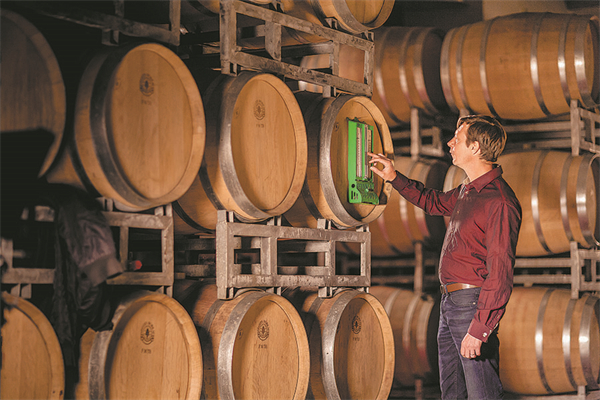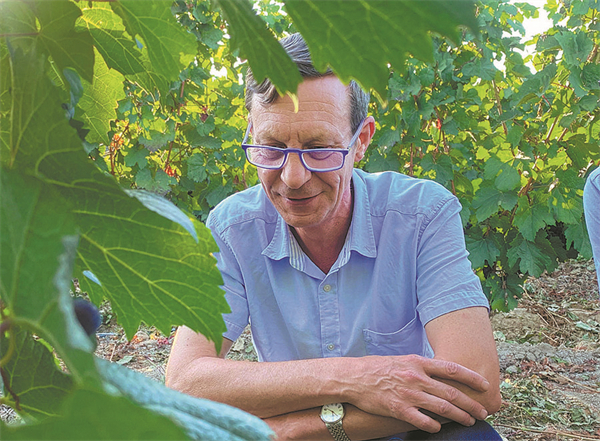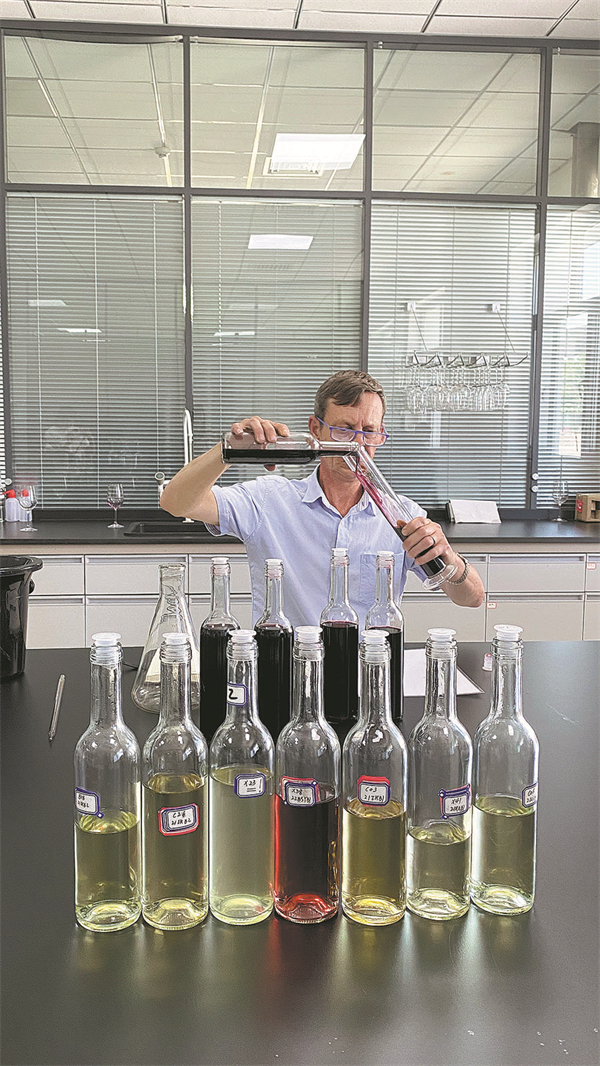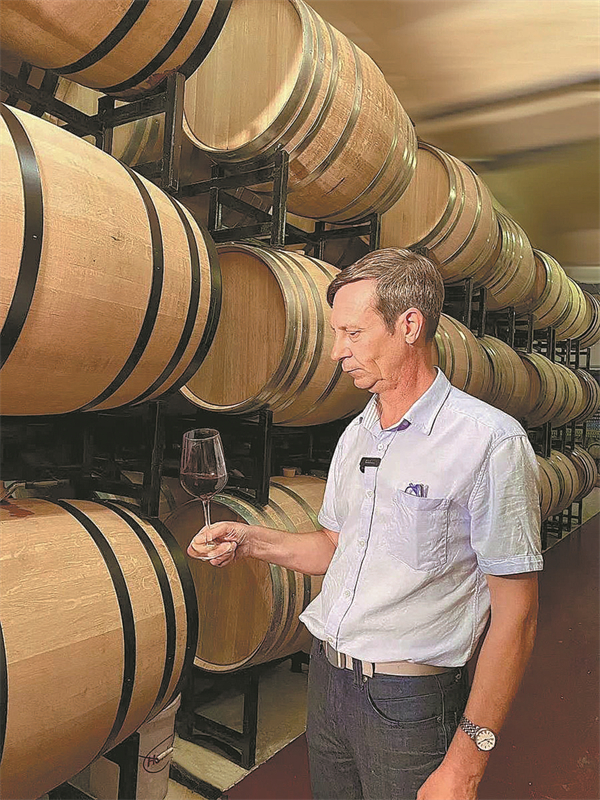Frenchman's wine journey a grape tale

Fred Nauleau checks the temperature in a wine cellar in the Xinjiang Uygur autonomous region. [Photo/seexinjiang.com]
Working in Xinjiang for more than 20 years, Fred Nauleau helps his company win recognition, honors globally.
From the picturesque Loire Valley in France to the vast and diverse Xinjiang Uygur autonomous region in China, Fred Nauleau has taken root in a foreign land for over 20 years, utilizing his expertise to create exceptional wines to rival the best in the world.
To the experienced French winemaker, his passion for wine transcends borders and breaks language barriers, and contributes to the development of an industry and the strengthening of cross-culture collaboration.
"Wine is the universal language of the world that can be tasted," the 57-year-old said, adding that it builds bridges and promotes cultural exchanges.
Located at roughly the same latitude as Bordeaux and California, Xinjiang is an ideal place for growing grapes and making wines, said Nauleau, who is employed by China's CITIC Guoan Wine Company.
Every September to October is vine harvest season in Manasi county, which is located just north of the Tianshan Mountains.
During this period, Nauleau's meticulous attention to detail encompasses every aspect of the harvesting process.

Nauleau checks on grape ripeness in a selected vineyard. [Photo/seexinjiang.com]
Along with his agricultural technology team, he carefully assesses the ripeness of every batch of grapes to determine the optimal harvesting date.
He also works with his team to study the taste preferences of the consumers and to blend the taste they want. In the wine cellar, he consistently tastes the wine and monitors the aging conditions, the delicate control allows each bottle of wine to become the best it can be.
The wine produced in the Northern Piedmont area of the Tianshan Mountains is well-rounded and has good color and aroma due to climate and soil factors, he said.
"Wine not only needs to satisfy the taste of consumers, but also should have the characteristics of the place of origin."
Nauleau's enduring commitment and endeavors have led to the company's wines winning hundreds of honors in competitions both domestically and internationally, including 240 awards.
These honors are recognition and affirmation of the quality of Chinese wine, he said.
His efforts were also honored when he received the Chinese government's prestigious Friendship Award in 2010.
The award is bestowed on foreigners who have made outstanding contributions to China's modernization and the promotion of exchanges and cooperation between China and other countries.
"The honor gave me great encouragement and motivation," he said, adding that it has made him more persistent in making the best wine in China.
Nauleau grew up in the wine-centric Loire Valley region of France, where his grandfather and uncle were grape growers and winemakers. He spent much of his childhood and adolescence in the vineyards, which instilled in him a deep interest for wine and winemaking.
His passion for the fragrance and his interest in biological science led him to study agricultural engineering in Bordeaux, specializing in grape planting and winemaking.
After graduating, he engaged in research at prestigious institutions like the National Research Institute for Agriculture, Food and the Environment, and the French Institute of Vine and Wine in the late 1990s.
In the summer of 2000, he learned of an opportunity with a Chinese wine company seeking an experienced winemaker.
Inspired by the ancient Silk Road, Nauleau packed his bags and embarked on a life-changing adventure, arriving in Xinjiang just two weeks later.
"For me, Xinjiang is a surprising and charming place. When I first came here, I fell in love with the region at first sight."

Nauleau blends different varietals in the Tasting room. [Photo/seexinjiang.com]
Xinjiang is almost three times the size of France, and the region's diverse terrain, from barren desert to vibrant oases, from lush grasslands to towering peaks, captured Nauleau's imagination.
It was also the region's dry climate, abundant sunlight and unique potential for producing high-quality wines that convinced him to stay, he said.
Yet, Nauleau's journey had encountered difficulties: communication and teamwork were substantial hurdles to overcome.
As Nauleau barely spoke Chinese, he relied on translators to convey his work guidance, a process that often took days to complete.
He not only had to explain the methods of winemaking, but also the basic operations such as how to connect pumps and complete subsequent operations after the white grape juice has been pressed.
To streamline operations and foster better understanding among his team, Nauleau installed a table and a whiteboard between fermentation tanks.
"Not only can the operation instructions and methods be explained through translation (on the whiteboard), but also the winemaking and operation methods can be expressed more quickly and efficiently through patterns."
These tools allowed for quicker, more efficient communication, ensuring that no detail was overlooked during the peak fermentation periods, he said.
Nauleau was deeply impressed after the first pressing season together with the many young technical personnel who had just graduated and were making wine for the first time. During which time they communicated with foreign technical personnel from France and Italy, and slept in the wine fermentation workshop, surrounded by cardboard boxes and labels.
"Whenever I recall those days, I feel very happy because it was a manifestation of hard work and good friendship."
During his more than two decades in China, Nauleau has experienced and witnessed the rapid development of China's wine industry, from winemaking techniques to vineyard cultivation.
China's vast geographical diversity, with its varying climates and soils, has created more possibilities for the production of diverse wines, he said.
International exchanges have flourished, and Chinese wine brands have emerged in international competitions, he added.

Nauleau samples wines in Manasi barrels cellar. [Photo/seexinjiang.com]
From a market perspective, Nauleau also observed the growing curiosity among young Chinese consumers, spurring the development of the domestic wine industry.
Beyond the world of winemaking, Nauleau has embraced China's rich culture, cuisine and natural beauty. He learned Chinese, met and married a woman from Xinjiang.
His travels with his family have allowed him to explore stunning landscapes like Xinjiang's Jiangbulake Grassland, Tianchi Lake in the Tianshan Mountains and the Lavender Garden in Ili, and savor local delicacies.
"Xinjiang is also diverse in terms of humanities, although we're not from the same country, we get along like family. "
This world requires diversity and harmony, and it is equally important in the wine industry, he said.
Nauleau said he is impressed by China's remarkable development, from its rapid economic growth and convenient transportation to its embrace of intelligent technology and smart agriculture.
"This series of changes has allowed me to see an open, prosperous and rapidly developing China."
Moreover, the Belt and Road Initiative has further strengthened global cooperation and exchanges between China and other countries, he said, adding that international expos and events have been held in Xinjiang to promote the region's economic development and connection with the world.
In May, the Belt and Road International Wine and Spirit Competition was held in Changji, Xinjiang, and global wine experts from more than a dozen countries including France, the United States and Italy visited his winery.
"These activities are becoming increasingly international, which is very conducive to promoting cooperation and development," he said.
China and France have also developed close ties due to the development of wine, he said.
In a joint statement issued during French President Emmanuel Macron's visit to China in April, France supported China's accession to the International Vine and Wine Organization and the hosting of the International Grape and Wine Industry Conference.
It marks deeper exchanges and cooperation between China and France in the wine industry, Nauleau said, adding that it is also the result of long-term exchanges and mutual learning between the two countries.